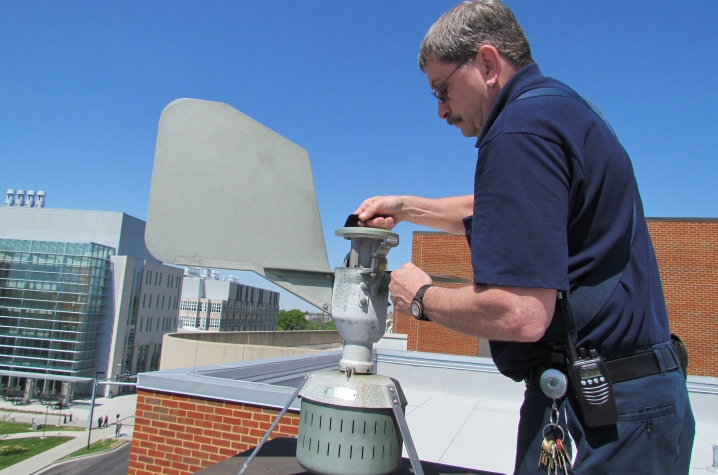UK Team Brings Kentuckians Daily Pollen and Mold Analysis
LEXINGTON, Ky. (April 13, 2012) — Flip on the morning television news or open the newspaper, and you will likely find out the pollen and mold counts for the day. These numbers, which for allergy sufferers can be used as a guide to how miserable they can expect to be, are the daily product of work by a University of Kentucky team.
UK has been collecting pollen and mold counts daily, early spring through late fall, for more than 20 years. The process begins high atop the University Health Services building on South Limestone, where a specialized device resembling a high-tech weathervane collects pollen and mold spores blowing in the wind. Every morning, Mike Mills from UK Physical Plant visits the pollen and mold station on the roof, collecting samples of what's blowing in the air over Lexington.
The samples are then delivered to a lab deep within the corridors of UK Chandler Hospital, where technologist Bob Morgan examines them under a microscope. Morgan determines the amount of pollen and mold per cubic meter of air for each 24 hour period.
Morgan's count is then posted on the website of the UK HealthCare Asthma, Allergy and Sinus Clinic. Local news outlets collect the information from there. The results are also reported to the National Allergy Bureau.
The numbers are also posted on the wall in the Asthma, Allergy and Sinus Clinic where Dr. Beth Miller treats patients with severe allergies.
According to Miller, allergy season in Central Kentucky is always harsh on its victims, but can seem particularly so when Spring follows a mild winter as it has this year. The absence of a hard freeze during winter can mean that allergy sufferers never get a break.
"Allergy season may be about two weeks early this year in our area," said Miller. "We are seeing moderate to high tree pollen counts; typical for Lexington. High tree pollen will continue until about late May, then we will move onto grasses then weeds."
"The best thing you can do is to stay in the house with the air conditioning on," said Miller. "People want to air out the house in spring, but that is the worst thing to do. If you do need to go out, try to avoid doing so in mid-morning when pollen and mold counts are at their highest. And of course, at UK HealthCare we can treat those whose allergies are bothering them. We particularly have clinical trials available for those who suffer from allergies combined with asthma."
According to Miller, allergy sufferers can expect continuous exposure to pollen and mold until the first frost of late fall or early winter 2012.
MEDIA CONTACT: Allison Elliott, allison.elliott@uky.edu






